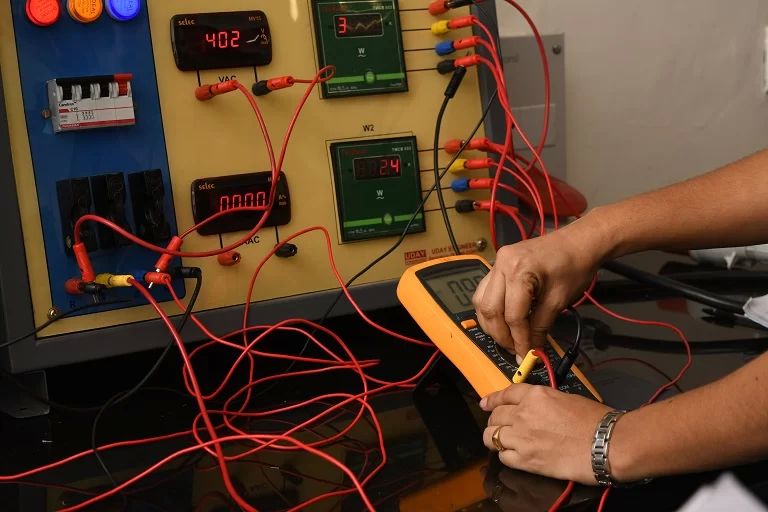INSTITUTION VISION
Be an Institution of Excellence with International Standards..
INSTITUTION MISSION
The Vision will be realized by
- Impart quality education along with Industrial exposure.
- Provide world class facilities to undertake research activities relevant to Industrial and professional needs.
- Promote entrepreneurship and value added education that is socially relevant with economic benefits.
DEPARTMENT OF ELECTRONICS & COMMUNICATION ENGINEERING
- Vision: To be a place of academic excellence by imparting quality education, carrying out research and technology development in frontier areas of electronics and communication engineering.
- To be a place of academic excellence by imparting quality education, carrying out research and technology development in frontier areas of electronics and communication engineering.
Mission:
- Professional Growth: To shape graduates into hardcore professionals who would become effective leaders and noteworthy innovators in the technology areas of electronics and communication engineering
- Lifelong Learning: To motivate and encourage our students to engage in lifelong learning which would help them keep abreast with contemporary developments in their fields of operation and enable them to leverage on the power of knowledge to become outstanding performers in whatever careers they choose.
- Team Work: To inculcate creative thinking through innovative and group work exercises which enhances the entrepreneur skills, employability and research capabilities.
- Skill Development: Enable students to develop skills to solve complex technological problems of current times and also provide a framework for promoting collaborative and multidisciplinary activities.
Program Outcomes (POs)
- Engineering knowledge: Apply the knowledge of mathematics, science, engineering fundamentals, and an engineering specialization to the solution of complex engineering problems.
- Problem analysis: Identify, formulate, research literature, and analyze complex engineering problems reaching substantiated conclusions using first principles of mathematics, natural sciences, and engineering sciences.
- Design/development of solutions: Design solutions for complex engineering problems and design system components or processes that meet the specified needs with appropriate consideration for the public health and safety, and the cultural, societal, and environmental considerations.
- Conduct investigations of complex problems: Use research-based knowledge and research methods including design of experiments, analysis and interpretation of data, and synthesis of the information to provide valid conclusions.
- Modern tool usage: Create, select, and apply appropriate techniques, resources, and modern engineering and IT tools including prediction and modeling to complex engineering activities with an understanding of the limitations.
- The engineer and society: Apply reasoning informed by the contextual knowledge to assess societal, health, safety, legal and cultural issues and the consequent responsibilities relevant to the professional engineering practice.
- Environment and sustainability: Understand the impact of the professional engineering solutions in societal and environmental contexts, and demonstrate the knowledge of, and need for sustainable development.
- Ethics: Apply ethical principles and commit to professional ethics and responsibilities and norms of the engineering practice.
- Individual and team work: Function effectively as an individual, and as a member or leader in diverse teams, and in multidisciplinary settings.
- Communication: Communicate effectively on complex engineering activities with the engineering community and with society at large, such as, being able to comprehend and write effective reports and design documentation, make effective presentations, and give and receive clear instructions.
- Project management and finance: Demonstrate knowledge and understanding of the engineering and management principles and apply these to one’s own work, as a member and leader in a team, to manage projects and in multidisciplinary environments.
- Life-long learning: Recognize the need for, and have the preparation and ability to engage in independent and life-long learning in the broadest context of Technological change
To know more about UG & PG Programs, Eligibility, Admission Procedure, Fee Structure and Scholarship, please fill this request information form.
Program Specific Outcomes (PSO)
- Interpretation Skills: Design, verify and validate electronic functional elements for a variety of applications with skills to interpret and communicate results.
- Core Competencies: Analysis, design and implementation of VLSI systems, communication systems and embedded systems.
Program Educational Objectives (PEO)
- Professional Development: Graduates will have a successful career in electronic and communication engineering or associated industries or higher education and research.
- Attitude towards Lifelong Learning: Graduates will have the ability and attitude to adapt to evolving technological challenges.
- Technical Innovation: To inculcate group work and team management skills to promote knowledge transfer leading to conceptualization and delivery of projects with varied complexity.
